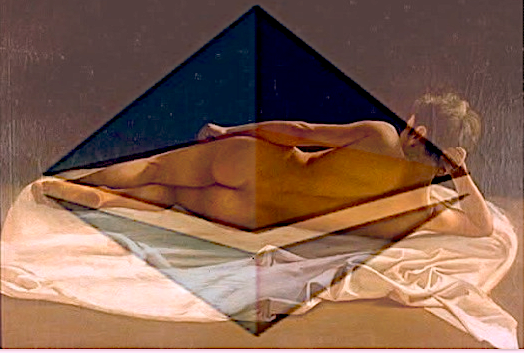Mississippi Acadie Goddam: How a French Acadian Artist Channels Alabama’s Bloody Sunday to Challenge Acadian Culture’s Silent Gatekeepers
Mississippi Acadie Goddam French Acadian Contemporary Artist Channels Alabama’s Bloody Sunday to Challenge Acadian Culture’s Silent Gatekeepers.

Claude Edwin Theriault, a Contemporary French Acadian artist, is known for his bold narratives that blend historical memory with a modern lens. Theriault, who identifies as both queer and Asperger, finds inspiration in stories of resistance and resilience against racial and cultural oppression. A recent and powerful influence on his work is the tragic event known as the “16th Street Baptist Church bombing” in Birmingham, Alabama, on September 15, 1963, where four young Black girls lost their lives in a white supremacist terror attack.
Queer Asperger Contemporary Artist Claude Edwin Theriault: Finding Inspiration in Birmingham’s Bloody Sunday and Pushing Back Against Cultural Oppression
This horrific incident also moved singer Nina Simone to create the protest song “Mississippi Goddam,” a bold anthem of anger, defiance, and the urgent call for change. Theriault channels similar energy in his Cajun Dead et le Talkin ' stick Mississippi Acadie Goddam song lyric project cultural work, confronting his experience of being ghosted by the oligarch-controlled French Acadian heritage industry that answers to no one.
Through his song lyric project, part of the ever-evolving La relévé Vol 4, Theriault’s work speaks to the Ghetto Acadian community, challenging its cultural norms and questioning its preferential treatment of musicians over visual artists. By drawing parallels between his experiences and the systemic oppression of the past, Theriault’s Mississippi Acadie Goddam song underscores the importance of pushing back, regardless of the barriers, so culture and artistic voice can move forward.
Reflecting on Birmingham's Bloody Sunday: An Enduring Legacy of Resistance
The Birmingham church bombing was a shocking moment in American history, sparking outrage across the nation and deeply impacting cultural figures like Nina Simone, who responded with the powerful anthem “Mississippi Goddam.” This song was not just a personal expression of grief and rage; it became a rallying cry for civil rights. Simone's lyrics echoed a collective demand for justice and equality, highlighting how art can encapsulate the anger, frustration, and determination of those who resist oppression.
“I don’t trust you anymore. You keep saying, ‘Go slow!’ Go slow! But that’s just the toe-the-line trouble.”
Though created in a different era and context, Claude Edwin Theriault finds a shared lineage of defiance in this tragedy and its artistic responses. As a queer Asperger artist in a traditionally conservative culture, he experiences a type of marginalization that, while not as violent as 1960s America, shares the themes of exclusion and erasure. He sees in Simone’s response to injustice an affirmation of his urge to speak out or die trying.
Inspired by Simone’s example, Theriault created Mississippi Acadie Goddam, a song expressing his frustration with the systemic gatekeeping enemies within Acadian cultural industries, which he feels fails to support and represent contemporary visual artists due to their being self-serving egoists toeing the Pride and Kitchen party envelop fewer and fewer locals are part of due to the socio-economic and socio-cultural ghetto status of Claregyle.
Read up on La version francaise
To be cancelled is the modern version of lynching. And behind the Heritage Patrimonial Industry scenes, your livelihood, your ability to survive, and your relationships with whomever you work with are all quietly attacked so that you can no longer function. There hasn’t ever been a proper study of the extent of cancel culture and how deeply and viciously it goes in cultures. It is not a dramatic exaggeration to say that people who are cancelled are privately pushed to the point of suicide; however, Theriault channels the Jackie and Yvonne spirit that shines the light in the Cultural Goulag Ghetto of Claregyle.
“And for what and why do the Oilgarch powers that be do this? In the hope that the entire Aadian people love the same music, the same books, the same stupid standup comedy, the same Acdian Pride politics, the same NFB films? This can never happen! Mississipi Acadie Goddam is the modern version of Mississipi-Goddam. Still, the fact that no label will release it indicates how childlike and frightened the Acadian Embassy Zombie Corporation music industry has become.
Mississippi Acadie Goddam: A Protest Song for Acadian Culture’s Underrepresented
In his Acadian song lyric project La relévé Vol 4, Theriault’s Mississippi Acadie echoes the discontent within parts of the Acadian community who feel ignored by the heritage industry. His experience of being sidelined by an oligarch-controlled cultural narrative led him to create Mississippi Acadie as a symbol of defiance.
Though Theriault acknowledges that his current ghosting is far from the racialized violence of Alabama in 1963, he draws a parallel in the way oppressive structures attempt to erase and silence voices that do not align with the dominant narrative. For Theriault, the ghosting he faces in French Acadian heritage is a modern form of suppression, less overt but pervasive. Hence, his publishing on the censor-free Ghost.io blockchain JS node platform.

I want a boat that floats and a heart that cannot go broke, Mississippi Acadie Goddam. Could someone please tell me where it all went so wrong? How are hope and people being sold off for a song? Money ain't worth nothin'; boats burnt at the wharf; nobody at the wheel; nothing left to steal. Mississippi Acadie Goddam.... Song lyrics that are relevant to their times.
Through Mississippi Acadie, Theriault questions the structures that hold back change in his community. He criticizes how Acadian culture gives most of its support and recognition to musical artists while ignoring visual artists like himself, thus missing out on a rich aspect of cultural expression. Theriault’s song and accompanying lyrics serve as a vehicle to address the lack of diversity within the Acadian artistic community, reminding audiences of the importance of supporting all forms of art as part of a healthy, evolving culture.
La relévé Vol 4: Gaining Ground and Recognition Through Google
Despite his obstacles within the French Acadian cultural establishment, Theriault’s La relévé Vol 4 project has begun to make waves beyond the oligarch-controlled gatekeepers of La relévé Vol 3. His project is gaining significant traction online, achieving multiple intended listings on Google’s first page for Acadian cultural topics. This digital recognition underscores the growing interest in Theriault’s work and the broader issues he raises regarding Acadian identity, artistic diversity, and systemic exclusion.
Theriault’s digital success demonstrates the power of self-publishing and online platforms to bypass traditional, restrictive systems. By reaching audiences directly through search engines and digital platforms, Theriault’s message is finding a receptive audience that resonates with his calls for inclusivity and recognition of marginalized voices. His work exemplifies how artists can leverage digital media to bypass institutional gatekeeping and deliver their message directly to the public.
The Future of Acadian Culture: A Call for Innovation and Inclusivity
Theriault’s journey is a reminder of the importance of innovation in cultural preservation. As he points out, without efforts to include new voices and fresh perspectives, Acadian culture risks stagnation, ultimately facing assimilation within the dominant Halifax-led narrative of Atlantic Canada. Theriault critiques the current state of Acadian cultural representation as overly controlled by a small group of cultural representatives who often prioritize mainstream values over authentic, diverse expressions of Acadian identity. He sees this as part of a broader trend toward cultural homogeneity, where unique regional voices are either diluted or silenced in favour of easily marketable narratives.

In Theriault’s view, the prevailing cultural narrative often prioritizes job security over authentic representation, with cultural representatives in Halifax toeing the line to maintain their positions rather than fostering a more inclusive, representative Acadian culture. This tendency, Theriault warns, pushes Acadian culture backward, moving it away from its vibrant roots and into a narrow, outdated framework. The risk, he argues, is a gradual erosion of Acadian identity as the culture becomes increasingly assimilated into a mainstream Atlantic Canadian context that doesn’t truly reflect its values, history, or diversity.
Fight the real enemy within: Claude Edwin Theriault’s Legacy of Ghosting Through Art of Song Lyrics.
Claude Edwin Theriault’s work embodies a powerful blend of historical awareness, personal experience, and cultural critique. Drawing inspiration from Nina Simone’s defiant response to systemic oppression, Theriault confronts the gatekeeping and exclusion he faces within the Acadian cultural industry. Through Mississippi Acadie Goddam and his ongoing La relévé Vol 4 project, he calls for a more inclusive vision of Acadian culture—one that values visual art as much as it does music and embraces a diversity of voices, experiences, and artistic forms.
His online traction and success in bypassing traditional cultural gatekeepers prove that the demand for diverse, authentic representations of Acadian culture is real and growing. Theriault’s story is an example of how artists can push back against oppressive structures, using digital tools to reach audiences directly and to foster a richer, more inclusive cultural landscape.
As long as Acadian culture clings to outdated structures of Pride and Grou Tyme Kitchen Parties and stifles innovation, it risks drifting toward irrelevance in an increasingly homogenized regional narrative. Theriault’s work is a testament to the enduring power of art as a force for change, a call for his community to embrace its diversity, and a reminder of the importance of resistance in the face of cultural erasure from the oligarchic Beaurogarce powers.
St. Augustine made me lose my rest... by and by

FAQ:
What is Claude Edwin Theriault's artistic focus?
Claude Edwin Theriault's work integrates historical narratives with modern perspectives, using song and art to challenge cultural gatekeepers. His innovative approach, particularly through the song "Mississippi Acadie Goddam," provokes thought around cultural oppression and artistic expression in French Acadian communities.
How does "Mississippi Acadie Goddam" resonate with French Acadian music fans?
"Mississippi Acadie Goddam" resonates with fans by addressing cultural suppression and advocating for artistic freedom within Acadian culture. The song reflects themes of defiance and resilience, drawing parallels between historical and contemporary struggles faced by marginalized communities.
What makes Theriault's work unique in the French Acadian music scene?
Theriault's work stands out through his use of song lyrics to critique and question cultural norms and artistic recognition within the French Acadian community. He broadens the cultural conversation by highlighting systemic issues, advocating for visual arts alongside music, and challenging traditional narratives.
How is Theriault's art gaining traction in digital spaces?
Theriault's work, particularly his "La relévé Vol 4" project, is gaining online recognition by directly engaging audiences through digital platforms. His success demonstrates the power of bypassing traditional gatekeepers to reach receptive audiences and promote a more inclusive Acadian culture.
Why is Theriault's message important for the future of Acadian culture?
Theriault's message is crucial as it calls for inclusivity, diversity, and innovation in preserving Acadian culture. By challenging outdated structures and promoting new artistic voices, he highlights the need for cultural evolution to maintain relevance in a modern context.
How does Theriault's song address the French Acadian heritage industry?
Theriault's song critiques the French Acadian heritage industry's preference for musicians over visual artists, highlighting a systemic gatekeeping issue. Using his art as a platform for criticism, Theriault encourages a more equitable cultural representation that values all art forms.
What impact does "Mississippi Acadie Goddam" aim to have on listeners?
The song aims to inspire change by highlighting cultural and artistic marginalization within the Acadian community. It calls on listeners to recognize and challenge these systemic barriers, encouraging a collective push for inclusivity and diversity in cultural narratives.
